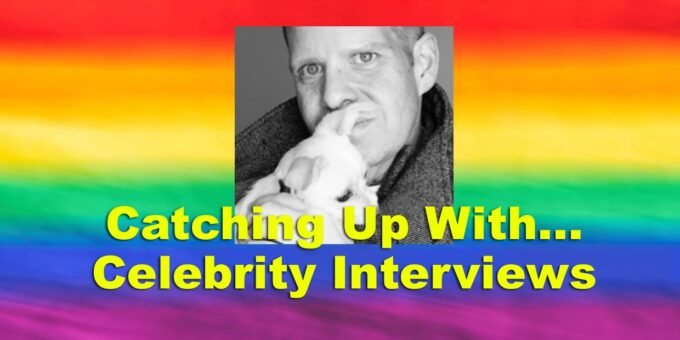
 I will never forget the first time that I saw Leslie Jordan. He was making a series of guest appearances on Designing Women as Reggie Mack Dawson, a swindler who took our precious Suzanne Sugarbaker for everything she was worth and bought a circus. That wasn’t me, Leslie tells me. Imagine my horror. Leslie Jordan and I have not met, yet during our brief phone conversation, he was easy and open with me. It was as if we had been friends for years.
I will never forget the first time that I saw Leslie Jordan. He was making a series of guest appearances on Designing Women as Reggie Mack Dawson, a swindler who took our precious Suzanne Sugarbaker for everything she was worth and bought a circus. That wasn’t me, Leslie tells me. Imagine my horror. Leslie Jordan and I have not met, yet during our brief phone conversation, he was easy and open with me. It was as if we had been friends for years.
Leslie is, of course, best known as Beverly Leslie, arch-nemesis of Will and Grace’s delicious Karen Walker. Leslie has turned some three appearances a year into one of the greatest, most memorable comedic characters of our time. I am sure Joan Collins kicks herself to this day for originally turning down the role (reportedly over a scene in which her wig was to be pulled off in a catfight with Karen).
Beverly Leslie, while his most recognized role, is only one of many roles on both stage and screen that Jordan has left his brilliant comic stamp on. Leslie Jordan began his career some twenty-five years ago in a PSA for the Selective Service (What?). A Commercial that ran for some ten years. He has toured the country for years in the one-man show based on his life, Like a Dog on Linoleum, always to sold-out houses. Today, he is an Emmy-nominated actor who is mulling over many offers, trying to decide which to accept.
I was thrilled to catch up with Jordan recently as he and his friend apartment-hunted. There were only a couple of interruptions. We’re fighting says Leslie. Would you just talk to him retorts the friend. Well, if what I heard was fighting, I need lessons from Leslie, in every relationship I’ve had that was as nice as things ever got!
I give you Leslie Jordan
SL: You were born in a rather conservative town, Chattanooga, Tennessee.
LJ: I grew up in a very conservative town in a very conservative Southern Baptist family.
SL: What was that like for you?
LJ: Well, you look back, and I think that is what made me what I am today. You know, I grew up in Sunday School, and I was very questioning. I was baptized fourteen times. That’s a true story. It never did take; I think it made me want to get out of there. I think that if I were heterosexual, I’d probably still be there. I’d probably be married and have some kids, and just miserable. I think that the wonderful thing about being gay and growing up there is that we tend to move to the big cities and want to make something of ourselves.
It’s interesting, though, I have gone full circle. I moved my mom out here from Chattanooga to Laguna Beach. She was here for years, and two years ago she said to me I want to go home. And I said To Chattanooga? I said, Mom, you live in Laguna Beach; it’s the prettiest place in the world. She said Well, I know, but I want to go home. So she is back in Chattanooga now.
I go back there quite regularly. You know, I just did my show (Like a Dog on Linoleum) March, April, and May in Atlanta. I was off every Monday, Tuesday, and Wednesday, and I would drive to see my mother. I am telling you that is not the Chattanooga that I left. It’s a wonderful city; I don’t think I could live there. I do have twin sisters who live here in California, and we’ve been talking a lot about trying to find some old Anabellum home and redo it and have us a bed and breakfast called Company’s Coming.
It all comes full circle. But I hated it growing up, during dodgeball here they are yelling Smear the Queer , and here I am tap dancing; but that’s how I honed my comedy skills.
SL: You mentioned growing up in the Southern Baptist Church, as did I. This is where I met my first boyfriend; did you meet any boys in church?
LJ: OH MY GOD, YES! Oh, those fun boys. They were rebuilding the Chapel, and we’d crawl up there in what was going to be the belfries and fool around. Oh, I was fooling around really, really early. I think that’s why I’m so messed up sexually. What does my therapist say? I have intimacy issues. I said, Well, honey, I didn’t even have sex in a bed until I was twenty-four years old. That’s the honest-to-God truth. My gosh, I had done it in parks and bookstores, and truck stops. Back then, it was wherever you could find it.
SL: In your mid-twenties, you just hopped on a bus and went to Hollywood.
LJ: Mid Twenties, lord, I was in my thirties.
SL: I was being generous.
LJ: Mid Twenties plus tax and deposit. I got on a Greyhound; I had a degree in theater. I went to school, and I didn’t know what to do, and everyone said Take that intro to theater class, which is a wonderful way to get your arts elective out of the way. The first day, we went up in front of the class and did some acting exercises. It just hit me like a drug. I thought this was what I wanted to do. That day, I went to the head of the department and I said Tell me what to do! I got a degree in theater, and then I thought I could either go to New York or I can go to L.A., and if I am going to start, I am going to start with a tan!
I am so glad that I made that decision. I’ve spent a lot of time in New York doing New York Theater, and it’s just Hell. It’s just awful. I love being in California, and I love the TV Industry and I love the movie industry. I do theater, I do a lot of theater, but I do it mainly to showcase myself for better TV and Film roles.
But here I am, almost twenty-five years later, and here I’ve got this Emmy nomination. If that’s not perseverance, I don’t know what is. I do have to tell you that right now, I am living the life that I have always dreamed of living. It’s amazing. I was having lunch with a friend of mine the other day, and he said Are you just shitting your pants about this Emmy? I said I’m not. It’s really interesting that somewhere over the years, I realized that happiness is You know, I remember thinking over the years, if I could just get that TV series, I’d be happy, if I could just get that six-figure salary, if I could just get a movie, but you know, none of that really brings you happiness.
SL: When you got to L.A., you started in commercials.
LJ: I did commercials forever, and then, I guess my break was Murphy Brown; I was a secretary to Murphy Brown.
SL: The first place that I remember seeing you is Designing Women.
LJ: You know that wasn’t me. I’ll tell you the story; usually, I just say thank you. There was an episode of Designing Women with a character named Reggie Mack Dawson. That was Harry Thomason, who was Linda Bloodworth Thomason’s husband’s brother. We could have been twins. He’s not even an actor; he is a Dentist from Little Rock. They put him on that show, and a few weeks later, I came in to audition for a show called Hearts of Fire. It starred John Ritter, Bill Bob Thornton, and Markie Post. I walked into the audition, and their mouths just all dropped, and they just kept staring at me. I didn’t know if I had spinach in my teeth or what they were staring at. Finally, they said You know Leslie, you look just like Harry’s brother. So, for years, people have thanked me for that wonderful part. But I promise you it wasn’t me.
SL: You are known on a cult status level for your role in Sordid Lives. Was that the first theater role that brought you a lot of attention?
LJ: Well, years ago, I did a Donald Margolis play that got some attention. I had won a lot of theater awards around L.A. Then I did another Del Shores show called Cheating that was a huge hit years ago. I have been Del’s muse for twenty years. I guess you’d say that Brother Boy got the most attention.
You know, we did it in the stage production, and one night Olivia Newton-John walked in and Olivia jokingly said If you ever make a movie of this, I want to play that lesbian that sings. Well, that stuck in Del’s craw, so he called her management and said Is she serious, because I think with her name attached we could raise the money. So we raised four hundred Thousand Dollars, which sounds like a lot of money, but in terms of movies, that’s not low budget, that’s no budget. It didn’t do that well at the theater, but it’s a huge cult hit.
SL: You are a self-described substance abuser and sex addict. I remember from your play, Like a Dog on Linoleum, the story of a young man you met while filming a movie overseas. It is a great example of sexual addiction. Tell me that story.
LJ: Well, I was doing a movie called Mad House. This was filmed in Bucharest, Romania. We all went out to the gay bar. There was only one gay bar because Romania was under Communist rule. We all went out to the gay bar, and I noticed that I was the most popular one. Well, we finally figured out that because I am older and silver-headed . They all want sugar daddies. These were young, beautiful boys who thought that you could get them out of the country.
Well, I was the belle of Bucharest. I met this beautiful young man, and everyone kept telling me, Don’t trust him because he’s Gypsy. All of the Romanian people at the hotel kept telling me, Don’t trust him, he’s Gypsy. Well, I trusted him, he stole everything I had, but then he came back with it all. All of it, thousands of dollars, Passport, leather jacket, leather bag, came back and were sitting under a tree out front of the hotel, and I went over there and asked him why he did it. He was sitting there with all of my stuff with tears running down his face, and he said It’s all I know. It’s just all I know.
Well, I just fell in love with him. I moved him into the hotel, much to the horror of the staff. It was almost like an interracial love affair. Then I wrote it into my show, and it was called Gypsies Tramps and Queens. I tried to get him out of the country several times, and I couldn’t, thank God! I had it in my show, and my director said Honey, this is not a mini series; this is just way too much.
SL: Back in America, you end up in the LA County Jail. Tell me about that.
LJ: Well, I had gotten arrested for two drunk driving arrests in a row, and they gave me One Hundred and twenty days in the Twin Towers. I had to do a little time down there. Well, on the seventeenth day down there, I had a panic attack, and I thought I couldn’t do this. That very day, they brought Robert Downey Jr. in, and because I was in the celebrity tank, I got out because of him.
SL: This brings us to Will and Grace and Beverly Leslie. This is undoubtedly one of the greatest comedic characters in television history. How did you land such a great part, the part that has led to your first Emmy nomination?
LJ: Well, people don’t realize that I have had twelve television series where I was a regular. I have done every kind of show known to man. This was the first one that was a really big hit, so it kind of put me in the public eye. I only do about three a year, but the character is so popular, and of course, this being the eighth year and it being over, I was so surprised to get the Emmy nomination.
In the past, I have done little campaigns, you put a little ad in this and that to try and get nominated. I didn’t do anything this year. It’s just absolutely wonderful, and it is at a time when they are casting a lot of the series for the fall, and I have had some offers, and I am just kind of mulling it all over and trying to decide which one I’m going to do. It’s just thrilling.
SL: I loved you in Boston Public. I hated to see your character killed off, but at the same time, seeing you whacked in the head by Betty White with an iron skillet was just brilliant. I am constantly amazed by her as an actress.
LJ: Oh, she’s amazing. You know she’s eighty-four years old and she’ll walk on the set and she’ll say to the cameramen who are these big, tall, butch kinda guys, You boys lookin’ at my ass?
























